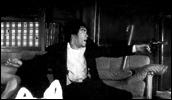Kamikaze Taxi
- Year
- 1995
- Original title
- Fukushu no Tenshi Kamikaze Taxi
- Japanese title
- 復讐の天使/KAMIKAZE TAXI
- Director
- Cast
- Running time
- 134 minutes
- Published
- 17 July 2001



by Tom Mes
Originally made for the video market (and released on that format in Japan in a longer, two-part version), Kamikaze Taxi is a movie of many sides. It's a mixture of genres, which in turn are mixed with strong and frank criticism of the discrimination that lies dormant within Japanese society.
Young yakuza Tatsuo (Takahashi) is in charge of scouting girls to serve the whims of Domon, a corrupt senator who carries his Japaneseness and his history as a kamikaze pilot on his sleeve. Domon turns out to be a first-rate pervert, and a violent one at that. The women usually return bleeding, battered, and bruised. When Tatsuo's girlfriend, also part of the organisation, protests, she is beaten to death by the gang's boss. Tatsuo, forced to watch helplessly as his girl is murdered before his eyes, swears revenge on Domon and sets out on a plan to rob the senator of the two million dollars hidden in a safe at his house. Enlisting the help of five buddies, Tatsuo enters the house at night. A panicked, chaotic heist ensues from which only Tatsuo escapes intact, and with the money in his possession. The furious Domon holds Tatsuo's boss personally responsible and puts the two-million debt on his shoulders, plus interest.
Meanwhile, Tatsuo encounters a taxi driver and rather than forcing him at gunpoint, he says he will pay for the journey. This forms the start of a very long cab ride indeed and with it, the film's tone switches. The gangster action film becomes a road movie and gains a soul in the process. Trapped together in this situation, the two men increasingly confide in each other. With Tatsuo we learn that the cab driver was born Japanese, but raised in Peru. Returning to his homeland armed with a rather shaky command of the Japanese language, he has found himself an outcast, unaccepted and discriminated against. He drives a beaten-up, graffitied station wagon and is a taxi driver not by choice, but because he's been unable to get any other kind of job (a predicament that even countless natives with a pocketful of qualifications and perfect command of the language have had to endure after losing their jobs over the past few years). He is a man with nothing to lose and when he learns from his passenger about the activities of the corrupt Domon, a man who symbolises the society that has spat him out, he becomes a natural ally. And a much more formidable an opponent than their pursuers ever imagined.
Kamikaze Taxi's numerous references to kamikaze warfare bring to mind the similar theme in Takeshi Kitano's later film Brother. Kitano's film could be seen as a kamikaze parable, but it uses this as little more than foundation around which to structure its plot, having little of any insignificance to say about history and national identity than a vicarious wish-fulfillment fantasy for those still suffering from an intercultural inferiority complex. Masato Harada on the other hand makes the kamikaze spirit but one aspect of his characters' psyches, preferring them to be above all human, but more specifically Japanese. Kamikaze Taxi asks the question of what it means to be Japanese and why some people are excluded from being just that, even though by any measure they qualify for the nationality. Those who emphasise their Japanese identity in this film are, in fact, all morally corrupt, while those whose simple wish it is to be an accepted part of Japanese society find themselves opposed from all sides. With the cab driver's decision to fight Tatsuo's fight for him, he confronts the proud with their own shortcomings, just as director Harada confronts his countrymen with theirs. The figure of the morally corrupt senator with the wartime past also allows Harada to refer to Japan's more painful historical misadventures, not shunning to highlight still-touchy subject matter like the comfort women issue (he would continue to raise the matter in 1997's Bounce Ko Gals).
Perhaps owing to Harada's relative distance and detachedness from his homeland (he lived and worked in the US as a journalist and filmmaker for many years) Kamikaze Taxi is remarkably frank and open in its criticism of the less wholesome aspects of Japanese society. They are aspects which are generally hidden from the outsider's view and as such the film reveals a side of the country which should come as a surprise to many. Add to this the fact that it also manages to be engaging and entertaining at the same time, and you have yourself one highly recommended piece of cinema.